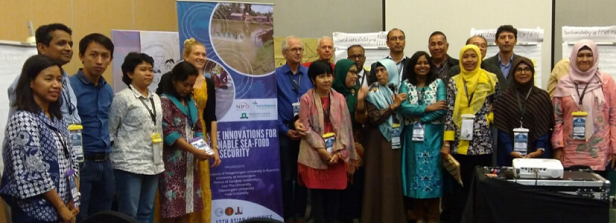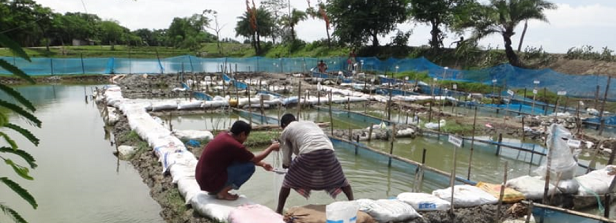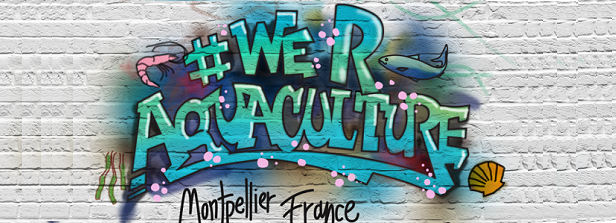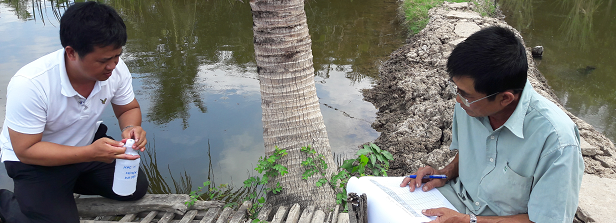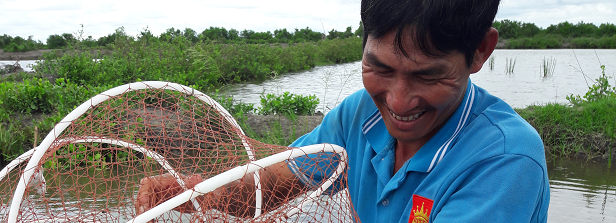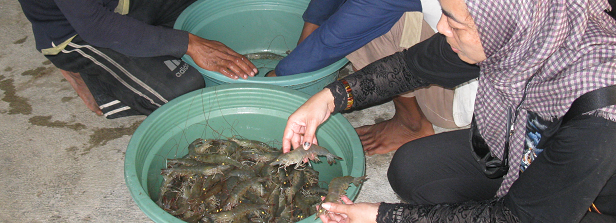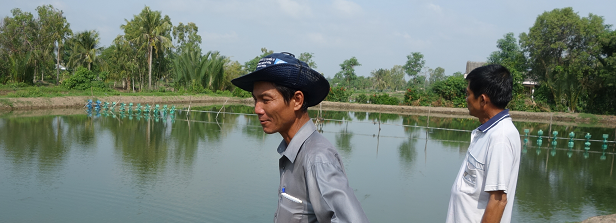Nutritious-system pond farming in Vietnam
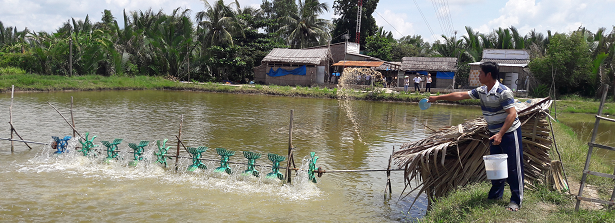
Duration: September 01, 2014 – September 01, 2019
Project information
Aim: Strengthening livelihoods within the aquaculture food chain, including vulnerable people, by providing stable income through more sustainable and predictable pond farming.
Objective: In nutritious-system ponds the potential of the pond ecosystem to mineralize wastes and produce natural foods is exploited. With this increase of natural food besides formulated feed in ponds the project aims to enhance sustainability and increase shrimp quality.
Method: Jointly with industry, an innovative feed-the-whole-system concept is developed that will make pond farming more sustainable and predictable, , while producing high quality and healthy seafood.
The research focuses on generating insight in 1) the dynamic processes related to production and transfer of omega-3 fatty acids by algae in the pond, and 2) ways to balance the algae: bacteria ratio for optimal decomposition, maintenance of water quality and nutritive value of fish and shrimp. In this way aquaculture becomes more efficient and predictable, feeding costs will be lower and the environmental impact will be reduced by fewer disease outbreak and water quality failures.
Countries: Vietnam.
Dutch policy goals: Increase sustainable food production; Decrease environmental pollution; and Improved access to nutrition.
Progress reports
Year 1: The first Steering Committee meeting and Research meeting were held in Vietnam in November 2014. The Steering Committee discussed research protocols and linkages between the PhDs and Post-doc in the project. The roles, tasks and responsibilities of the Post-Doc and the innovation platform in terms of knowledge transfer were also discussed. During the research meeting with representative present of all project partners, it was decided that the project will focus on white shrimp (Penaeus vannamei) as model species and semi-intensive shrimp ponds as model farming system. Attention was also given on how technical aspects and research protocols will be shared among project partners.
After the November meeting, it took one year to recruit the second PhD and Post-Doc for the project. This was twice as long as expected, causing delay in the execution of the project. However, now the project team is complete.
Summary mid-term review: The project aims to increase the contribution of natural food produced in ponds to the target production, and to make aquaculture less reliant on fish-oil and fishmeal. Fundamental research on pond ecology and food web dynamics will provide insight on how to replace this contribution. Novel insights are shared and discussed within a multi-stakeholder innovation platform (IP) to design and evaluate iterative trials at farm level to ultimately design new nutritious-pond-feeds for aquaculture.
- Research showed that removing fishmeal and -oil from shrimp feed did not reduce significantly shrimp growth. Also replacing expensive organic nitrogen and carbon inputs by cheap inorganic forms did not affect shrimp growth;
- Participatory analysis of the shrimp system showed that for the uptake of the technology, the nutritious system ponds need to be more resilient to climate change and disease agents than existing systems, and need to counteract inefficiencies in input quality control and disease management at the landscape level.
- An innovation platform composed of farmers, extension service, private sector, researchers and NGOs defined experimental trials and their monitoring. The results of these first trials will be discussed within the IP early 2017 together with results from fundamental research components of the project.
Year 3: The Nutritious Pond aims to increase the contribution of natural food produced in ponds to make aquaculture less reliant on fish-oil and fishmeal. Research in Wageningen showed that removing fish oil and fish meal does not significantly lower biomass production of shrimp, and that shrimp were able to get their required protein from the natural food in the tank when 50% of feed was replaced by fertilizer. Fundamental research in Vietnam confirmed that addition of CH increases bio-floc density and shrimp yield. The on-farm trials showed that compared to conventional practices at control farms, the nutritious pond system is more stable and had no-disease outbreaks, resulting in positive financial results for farmers. Surveys showed that sustainable intensification is hampered by the minimum investment attitude of farmers due to limited financial returns and access to credit, to the low compliance with regulations on inputs, and to institutional orientation on maximum yield.
Year 4: Nutritious Pond aims to increase the contribution of natural food produced in ponds to make aquaculture less reliant on fish-oil and fishmeal and to increase the sustainability of pond farming. In addition of previous progress in understanding pond ecology, research at Wageningen University and experiments in Bangladesh and Vietnam showed that conventional pond systems are not efficient in contributing to shrimp diet, while shrimp in green tanks can be raised without additional omega-3 inputs. In Vietnam, experiments in the Mekong Delta showed that reduction of the feed load of 20% combined with additional cheap carbohydrate achieved similar yield as conventional shrimp culture practices. Additional research identified corn starch as the most promising type of carbohydrate providing the best results on shrimp growth. Farm trials in the Mekong Delta showed higher individual growth per day in trial ponds compared to control ponds.
Behaviour analysis of Vietnamese shrimp farmers showed that their perception of market risks and disease risks influences adoption of technology and risk management strategies. The same survey, showed that developing farmers’ clusters facilitates access to new source of information and adoption of technology.

